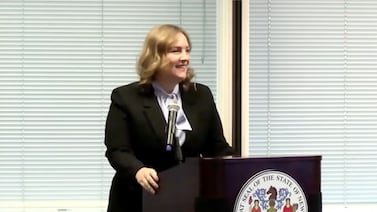Sign up for Chalkbeat Colorado’s free daily newsletter to get the latest reporting from us, plus curated news from other Colorado outlets, delivered to your inbox.
Public education has lost its way, the presenter told the school board of District 49, which includes part of Colorado Springs and sprawls northeast.
Schools “have drifted further and further away from why we started,” he said. “We have taken on more and more responsibility. We’ve taken more and more away from parents.”
The speaker was Dan Snowberger, a longtime Colorado school superintendent and executive director of a fledgling group called Colorado Leaders for Academic Success, or CLAS. He was there last month pitching the District 49 school board on joining the group, which he described as focusing on boosting student achievement and protecting parent rights.
Formed in late 2023 as an affiliate of a national group with the same mission, CLAS has emerged at a time when conservative-fueled policies — ranging from library book removals to restrictions on transgender students — are in ascendance. And while the group’s leaders say it’s a nonpartisan nonprofit open to school boards of all stripes, its focus on parental rights, in particular, echoes messaging common in conservative circles.
The group, which is still in the recruiting phase, has six member districts spanning the state. At least half of them are involved in high-profile lawsuits over book bans or transgender students.
Liz Wilson, co-founder of The Pro-Colorado Education Project, a left-leaning group, said CLAS promotes the “parental rights of parents who believe certain things, not the parental rights of all parents.”
At the District 49 board meeting, Snowberger described his group’s parental rights focus this way: “Children come to school with the values instilled in them at home and they should go home with those values.”
The five-member District 49 board was divided about joining CLAS. Some members were enthusiastic.
Board member Deb Schmidt said, “I’m really glad to see somebody trying to dial back some of the vast overreach that this state has thrust upon us.”
But board member Mike Heil worried about what he sees as the group’s partisan bent.
“I don’t think we should be spending taxpayer resources to bring that into our district,” he said.
CLAS is small but growing
Most of CLAS’s six member districts are small and rural. They include Elizabeth, Woodland Park, Brush, Delta County Joint District 50J, Montezuma-Cortez, and Education ReEnvisioned BOCES, which authorizes and oversees a handful of online and brick-and-mortar schools. Some individual school board members from other districts have also joined.
District 49, which enrolls about 27,000 students, plans to join, a district spokesperson said by email.
For districts, the annual membership fee is $1,000. Snowberger said the group will hone board members’ leadership skills in “governance, professional development, communications, legislative outreach, networking, and policy.”
In the year and a half since CLAS launched, the group has had three executive directors. Snowberger took the helm in June. He works part time for CLAS, where he is the only employee, and full time as superintendent of the 2,700-student Elizabeth School District southeast of Denver.
Cortney Salt was the group’s original executive director. She now works at the Freedom Foundation, which describes itself as a “battle tank that’s battering the entrenched power of left-wing government union bosses.”
Beth Suppes, a school board member in Delta County Joint District 50J and one of three CLAS board members, said she’d like to see every school board in Colorado join the group.
Critics of CLAS, as well as some supporters, have described the group as a conservative version of the state’s primary group for school boards: the Colorado Association of School Boards. That group, which has 13 employees, offers leadership training, lobbying services, model policies, and annual conferences.
When Mike Lynch, a school board member in the Montezuma-Cortez-district and also a CLAS board member, pitched CLAS membership to his fellow Montezuma-Cortez members last November, politics was part of his message.
“The current association,” he said, referring to the Colorado Association of School Boards, “has what seems to be in some people’s eyes, as kind of a liberal viewpoint.”
Bryson Miller, a school board member in Brush, also referenced political leanings at a board meeting last October.
“CLAS in my understanding is… an organization that is focused on conservative values and ideologies when it comes to public schools,” he said.
Matt Cook, director of public policy and advocacy at the Colorado Association of School Boards, declined to comment on assertions that his group, which is often called CASB, is liberal and CLAS is conservative. He said by email that his group counts 177 of 178 school boards as members.
Snowberger said CLAS is partially funded by The Schuck Initiatives, a Colorado Springs-based foundation that describes itself as protecting and enhancing “capitalism, private property rights, and individual liberty.”
Both Snowberger and Suppes said CLAS is not meant to replace CASB and shied away from the idea that CLAS tilts right politically.
“If academic achievement and ensuring that parental rights and responsibilities are clearly outlined in policies … is political leaning, then guilty as charged,” said Snowberger, who said his district remains a member of CASB.
Suppes said, “I don’t see CLAS as a whole, as … left, right, Republican, Democrat. That’s not at all our driving force.”
At the same time, she said some of the sample school board policies crafted by CASB have “been concerning to me as a conservative.”
She cited one that came out following the passage of a 2024 law requiring school staff to use transgender students’ chosen names.
“It was written from CASB in a very parent notification-negative light,” she said.
CLAS offers networking and sample policies
CLAS holds monthly member calls, a summer policy summit, and a spring learning conference, among other events.
Snowberger, who described the “meat” of CLAS as networking opportunities, said the group helps districts focus on student achievement by highlighting research on the science of learning and training board members to support teachers, adopt curriculum, and establish budget priorities in line with that goal.
He said it’s the kind of assistance he doesn’t see other groups, including CASB, providing.
“In Colorado, four in 10 kids can read on grade level,” he said. “So, it’s really been frustrating as school districts, because there’s not been a whole lot of effort to support school boards and what they can do to try to change that pattern.”
Students in most of CLAS’s member districts, including Snowberger’s own, are performing below the Colorado average on state tests in math and literacy.
Besides networking and training, CLAS offers a policy bank with about 20 sample policies that school boards can adopt, Snowberger said. In contrast, the Colorado Association of School Boards offers more than 400 sample policies.
One CLAS sample policy that Snowberger shared with Chalkbeat covers a host of parent rights and responsibilities. For example, it states that parents have the right to know the credentials of teachers and administrators and the responsibility to review their children’s syllabi and assignments.
Heil, the District 49 board member, said he worries the parental rights prong of the CLAS agenda will focus on conservative causes that undermine education.
“I would argue these culture war issues only detract our attention away from student achievement,” he said.
Several CLAS districts are currently involved in lawsuits over such issues. Elizabeth is fighting to remove 19 books from its school libraries. Montezuma-Cortez and Education ReEnvisioned BOCES recently joined a lawsuit spearheaded by District 49 over state rules that allow transgender athletes to participate in school sports that align with their gender identity.
Asked about the many hours of debate the Elizabeth district devoted to the 19 library books instead of student achievement, Snowberger said, “I would agree that that took up a considerable amount of time, and that’s over. And we are moving on because we have learning of children that we’ve got to focus on.”
The lawsuit, brought by two students in the district, an NAACP chapter, and an authors group, is ongoing.
Correction: A previous version of this story misstated Matt Cook’s title. He is the director of public policy and advocacy at the Colorado Association of School Boards.
Ann Schimke is a senior reporter at Chalkbeat. Contact Ann at aschimke@chalkbeat.org.






